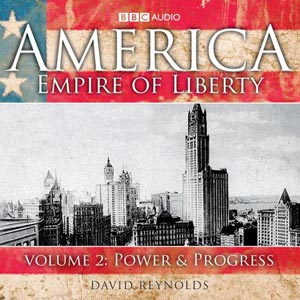America, Empire of Liberty
America, Empire of Liberty – Volume 2: Power & Progress by David Reynolds. BBC Audio, ISBN: 9781405677813, 400 minutes (on six CDs), £24.47
About the reviewer: Dr Nicola Pizzolato is Honorary Research Fellow at Queen Mary University, London. His current research project is on peonage, compulsory work in order to pay a real or alleged debt. He is investigating these forms of unfree labour that persisted in the American South between the 1930s and the 1950s; and the numerous groups and individuals who campaigned, organised, and protested against these practices. His most recent publication is Challenging Global Capitalism: Labor Migration, Radical Struggle and Urban Change in Detroit and Turin (Palgrave, 2013). He is currently co-writing a book on Antonio Gramsci and his political pedagogy.
This is the second instalment of an ambitious ninety-part Radio 4 series that sees David Reynolds, a Professor of International History at Cambridge, narrating the whole scope of American history. The radio programme is complemented by the publication of a one-volume book which has received mixed reviews. Volume 2 enthrals the listener by recounting a crucial stretch of United States history, from the Civil War to World War Two – two conflicts that have profoundly affected the course of that country. Reynolds tells this story with a vivacious style in which a wealth of anecdotes is woven into the big picture. The protagonists are as different as a union private and a President of the United States; a patrician southern lady and an African American labour leader—a sample of the different voices that, according to the author, made America. As the narrative unfolds, often in an epic tone, listeners learn about the construction of national identity, electoral strategies, race relations, industrial prodigies such as Andrew Carnegie or Henry Ford, and much more. I found Reynolds most effective when he pauses the fast pace of the narrative to linger on a smaller story or a biographical sketch: Carnegie’s rise from rags to riches, the way in which the railroad standardized time zones, the boisterous habits of Teddy Roosevelt, or the unconventional life of Clara Bow, the ‘flapper’ who epitomized the Roaring Twenties. The smaller stories add depth and are usually thoughtfully tied up to the larger picture.
 When, occasionally, Reynolds confronts larger historiographical knots (i.e. ‘why there was no socialism in the United States?’) the format of the programme, which requires a snappy narrative, prevents him from giving a satisfying answer. Far more effective analytical points are provided by the frequent comparison with Britain or with current events. For instance, the statement that ‘Britain’s industrial revolution spanned a whole century, America’s took only 30 years’, while slightly imprecise, gives a sense of the momentous social transformations of the Gilded Age. Later on, in the episode on American imperialism, the author aptly highlights the chilling parallels between the Philippine war and the war on Iraq.
When, occasionally, Reynolds confronts larger historiographical knots (i.e. ‘why there was no socialism in the United States?’) the format of the programme, which requires a snappy narrative, prevents him from giving a satisfying answer. Far more effective analytical points are provided by the frequent comparison with Britain or with current events. For instance, the statement that ‘Britain’s industrial revolution spanned a whole century, America’s took only 30 years’, while slightly imprecise, gives a sense of the momentous social transformations of the Gilded Age. Later on, in the episode on American imperialism, the author aptly highlights the chilling parallels between the Philippine war and the war on Iraq.
Overall, the thirty episodes contained in this CD-box, each roughly thirteen minutes long, are instructive, entertaining, and captivating as an introduction to the subject. They are peppered with irony and capture the paradoxical traits of the United States – a land founded on liberty as well as slavery, proud of its economic might, yet alien to the notion of economic justice. Furthermore, as it is apt for a radio programme, every episode ends with a bit of suspense. However, for the practitioner or the scholar of American history, this is a far too conventional narrative in both periodization and sources. Reynolds illustrates his points by using extracts extremely well known to historians. For instance, the diaries of the slave owner wife Mary Chesnut, or of union soldier Elisha Hunt Rhodes, are classics of every textbook and figure prominently in famous documentaries such as Ken Burns’ The American Civil War (1990). If I were to use Reynolds’ audio narrative in a classroom I would have cherished the possibility of presenting more original material to complement what is already found in many survey books of American history.
Perhaps, it would be a difficult task to convince students to buy the CDs and download them into their iPods (and the occasional avarice of ambience sounds and music as well the problematic embedded index of the tracks would make it more difficult), but one should acknowledge David Reynolds’ effort to tell a sweeping, epic story to everybody while retaining scholarly legitimacy.
Nicola Pizzolato

 Learning on Screen
Learning on Screen